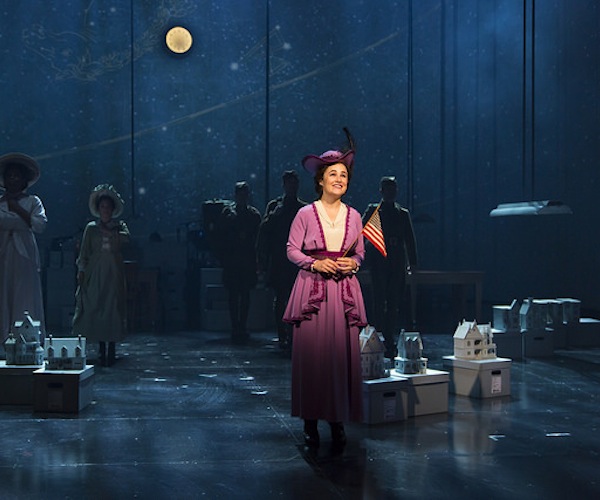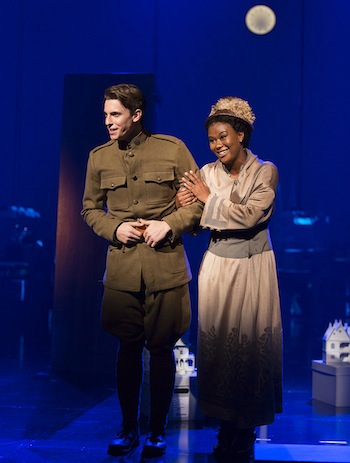Theater Review: “Unknown Soldier” — A Musical About the Power of Memory
One of Unknown Soldier’s powerful choices is that its central characters are not your standard young lovers — a single mother, a veteran, a woman in her 40s with a medical career, a nebbishy researcher.
Unknown Soldier Book & Lyrics by Daniel Goldstein, Music & Lyrics by Michael Friedman. Directed by Trip Cullman. In the Nikos Stage at the Williamstown Theatre Festival, Williamstown, MA through August 9.

Lauren Worsham (Lucy Lemay) and cast in the Williamstown Theatre production of “Unknown Soldier.” Photo: T. Charles Erickson
By Kate Abbott
A girl and an old woman stand at a kitchen table in Troy, N.Y., looking at a photograph in an old newspaper. In it a young woman in a long dress is sitting on the grass with a man in a hospital gown, and the caption calls him “the Unknown Soldier.”
Thirty years later, Jessica Phillips as Ellen Rabinowitz comes back to the dim house where her grandmother raised her. Cleaning closets after her grandmother’s death, she comes across the photograph she once submitted with a school report on World War I: her grandmother, Lucy, as a young woman with an unknown man. On impulse she reaches out to Erik Lochtefeld as Andrew, a librarian and archivist in upstate N.Y., to find out more about it.
That impulse begins a powerful and musical quest in Unknown Soldier, a new work by Obie award-winning composer Michael Friedman and Broadway director/playwright Daniel Goldstein which is receiving its world premiere production via the Williamstown Theatre Festival.
Ellen’s mother died when she was born, and her grandmother took her in. Ellen got out of Troy as soon as she could and has not come back while her grandmother lived.
Now she wants to ask her grandmother questions — who she was as a young woman, and how she felt about Ellen’s grandfather, who died in the war, and why she had tea with a shell-shocked soldier in a mental home and kept a memory of it all her life.
Ellen wants to know who Lucy really was. The play asks a question of deep significance. How many people in this country have lost their family stories, because people died of widespread illness or were brought here by force, or had their names changed, or came here from thousands of miles away to make a living?
And in time it becomes clear Ellen wants to understand her grandmother as a way to understand herself.
The action moves freely in space and time — with the music and the set to guide it. A plain table invokes the house in Troy. Around it, across the stage, stacks of grey filing boxes, wooden tables, and hanging lights are used to suggest a military post in the Great War or the archives in present-day Cornell.
And over the course of the production the grey stage shifts like a shadow puppet play. A luminous circle hangs in the air and plays different roles — a full moon, a clock face on a wall, the ceiling of Grand Central Station. Out of the grey boxes come miniature houses and towers and steeples, the structures of a doll’s city. These objects bring sadness and magic and a feel of time passing, like a child’s nursery or the night sky in Peter Pan.
The story moves between Lucy’s young life and her granddaughter’s middle age, focusing on the period about World War I. This is not a story of death and gore and rotting trench feet: not on the front lines. It follows people the war broke, a shattered soldier and a woman who lost the husband she barely knew.
The story begins in Troy — named for Ilium, the site of the Iliad, where a war destroyed a civilization. But Oscar award-winning actress Estelle Parsons, playing the vital, disillusioned grandmother Lucy, sings about the Odyssey instead, the wine-dark sea and Penelope left at home to wait and weave and raise a child alone.
The music shifts with the time. The turn-of-the-century young Lucy in the purple gown and crowned hat sings in an operatic soprano. Ellen, the 21st-century professional woman, sings in a powerful and raw free verse that gathers harmony and rhythm over the course of production.
One of the leading men is a shell-shocked amnesiac. Derek Klena as Francis Grand has the challenge of playing a man who does not know who he is. He sings in a few broken words and these are enough to fill the room with the bombarding noise of shells and shrapnel and the fears of mental illness and a life cursed with perpetual unfamiliarity.

(L to R): Derek Klena (Francis Grand) and Christina Sajous (Nurse) in the WTF production of “Unknown Soldier.” Photo: T. Charles Erickson.
The loneliness of Lucy’s Troy in the 1920s and Ellen’s contemporary Troy echo and flow together. At times they give way to satire and it is powerfully sung — Christina Sajous provides a vivid alto — in a tone different enough to break into the mood and pacing of the story.
Around these quick shifts, the play moves easily and clearly between eras. In one timeline, Lucy, the young widow, meets Francis, a sick man without a past. In a second, Lucy in middle age loses her daughter and faces her granddaughter. And in a third, Ellen and Andrew meet in their middle years, at a time of change for them both.
Ellen and Andrew begin to recognize how passionately they do not want the lives they have built. In one of the most powerful sequences, because comes off as starkly honest, she confronts the choices she has made. She and Andrew both ask the question the young Lucy, Lauren Worsham, repeats in pain to the Unknown Soldier — can I start over — let me start over — day by day by day?
It is one of the play’s powerful choices that its central characters are never standard young lovers — a single mother, a veteran, a woman in her 40s with a medical career, a nebbishy researcher. At the height of the action, Francis Grand dances with Estelle Parsons, and the light shines on her white hair.
Their gentleness brings a sense of sadness, because Lucy held onto that dream of the past hard enough to lose the present. But it comes with joy, as so much of this work does, because it ignores conventions and sees life whole. It is deeply powerful to see a woman in her 40s take dynamic charge of her life and an elderly woman with laughter and toughness dance in Grand Central, in the light.
Kate Abbott, a writer based in Western Massachusetts, served as editor of Berkshires Week and then Berkshires Week & Shires of Vermont magazine, a year-round weekly arts and coltural publication in the Berkshire Eagle, Bennington Banner, and Manchester Journal newspapers from 2008 to 2015. She holds an M.F.A. in fiction from the University of New Hampshire and has published poetry in journals including the Comstock Review and Entelechy International. She enjoys talking with people, walking in the woods, playing contradance recorder, and writing about all three.
Tagged: Daniel Goldstein, Kate Abbott, musical, Trip Cullman, Unknown Soldier, Williamstown-Theatre-Festival
